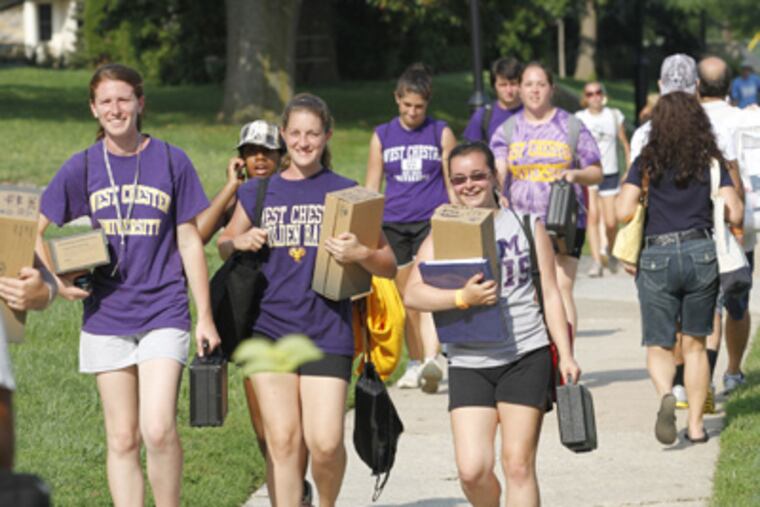West Chester University plans for growth, new image
When did West Chester University's changing focus really catch the attention of prospective students? It might have been when Abby Remington, who lives in town, thought she didn't have high enough SAT scores to get accepted and "came home and cried."

When did West Chester University's changing focus really catch the attention of prospective students?
It might have been when Abby Remington, who lives in town, thought she didn't have high enough SAT scores to get accepted and "came home and cried."
Or it might have been when her friend Meg Wright of Ocean City, N.J., tossed aside plans to go south for college after a high school visit to the campus.
The two 2010 graduates represent a noteworthy change in a school that used to concentrate on teaching and music.
During the last decade, the university, with 14,200 undergraduates, has become a first choice of high school seniors from across the region wanting to pick from a broad range of majors.
Now, as the fall semester gets under way, it is preparing to launch new academic programs and expand its online and graduate-degree offerings. It is continuing major construction projects. And its ties with West Chester borough are on the upswing.
But despite these strides, the university is still pushing to get the word out that it's much more than a fallback school for some.
"People I don't think yet understand the level of quality we have achieved," president Greg R. Weisenstein said.
To help get the message out, the university plans a broad advertising campaign in the fall.
Weisenstein, who took office in 2008, is completing a strategic plan for the next decade. Its goal is to increase the university's reach by sharply expanding online academic programs and to ensure that students on campus are better prepared for jobs in local industries such as health care and in technological skills.
"The sweet spot certainly is health care," said Roberta Snow, who is chairwoman of the management department and is one of the plan's architects. The university is working with drugmakers on programs such as a new undergraduate degree in pharmaceutical-product development.
It is also awaiting state approval to offer a doctorate - the school's first - in nursing. The university has about 2,000 graduate students.
Meanwhile, West Chester is seeing increased competition for freshman admission. In 2009, for example, its acceptance rate of 49 percent was lower than those of Temple and Pennsylvania State University's main campus, according to U.S. News and World Report.
Snow sees a challenge in West Chester's mission, as one of 14 state-owned colleges, of educating a broad swath of Pennsylvanians.
Since space on campus is almost full and physical expansion is out - most of the land around the campus is residential - the school sees its future expansion in the realm of online degree programs.
It already offers an online master's of business administration. By the end of the academic year, Weisenstein wants each of the university's five colleges to offer an online graduate program.
Those initiatives are meant to complement a major construction push. Since 2002, the university has spent about $250 million on construction, with $235 million more scheduled through 2016, ranging from overhauls of student housing to a new business and public-affairs center.
At the same time, the university has had to deal with a steady decline in state funding.
In 1990, two-thirds of its operating budget came from the state. Today, that number is down to 25 percent, according to Mark G. Pavlovich, vice president of advancement.
Though West Chester did not have to lay off professors after steep state cuts this year, Pavlovich said the university was focusing on seeking alternative sources of revenue in the form of corporate sponsorship. It now has a center for product research that tests products for Microsoft Corp.
Pavlovich also said the school was stepping up its fund-raising. Ten years ago, the school was averaging between $1 million and $2 million in gifts - that's now up to between $5 million and $6 million.
Though much of Weisenstein's academic and fiscal planning will take years to implement, his effect on relations with West Chester borough is already being felt by town leaders such as Malcolm Johnstone, executive director of the West Chester Business Improvement District, which represents downtown businesses.
"I think we have had a shift in that part of the culture" since Weisenstein took office, he said.
While Johnstone said previous administrations kept the public at arm's length, Weisenstein has forged close relationships with elected officials and there's "a direct involvement and engagement at the highest level."
Weisenstein, for his part, said that he had tried to be more "deliberate" in engaging the borough and other municipalities where West Chester has a presence and regularly has local mayors over to his house for dinner.
Only 38 percent of undergraduates live on campus, so problems in the community are inevitable, according to Police Chief Scott Bohn. Nuisance crimes, most stemming from alcohol use, have ranged from 2,100 to 2,300 during the last five years.
Incidents are concentrated near downtown and the neighborhoods surrounding the school's two campuses, to the south of the main commercial strip.
Rosalie Umile-Small, 38, lives near one of those neighborhoods and called students a "double-edged sword," sustaining a bustling downtown but at times a "nuisance."
"It is ridiculously loud. They damage things all the time," she said, noting that her car had been damaged by drunken college students.
Mayor Carolyn T. Comitta said the university had worked with the borough to mitigate problems by forming two working groups that address quality-of-life issues.
The university and borough are also testing out a new town-watch program in neighborhoods near the school.
Given the economy, Comitta said, "there are struggling communities all over this country who would love to have our problems."